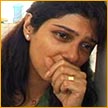
|
India's first DV film deserves kudos
Let's Talk and more delights at the ongoing MAMI
|
Deepa Gumaste
Radhika Sareen (Maia Katrak) tells her friend Rita (Anahita Uberoi) that she is pregnant. But she is not sure the baby is her husband's. This is as dramatic a beginning any film can hope to have. Ad filmmaker-turned-feature film director Ram Madhvani has his audience glued with this sensational admission in scene two of Let's Talk.
The soon-to-be-released film's first public screening was held at the International Film Festival, Mumbai, Monday.
From Radhika's astounding revelation, the action moves to her mind where she conjures up various possible scenarios as she imagines her husband Nikhil (Boman Irani) reacting to this confession in several different ways. His first and most obvious reaction is pain, followed by disbelief, then sarcasm, anger, even violence and finally resignation.
Of course, we never find out what happens next as the entire film is played out only in the heroine's head and whatever we see of the hero is her interpretation of him.
Madhvani clarifies that his film is not merely about infidelity. "It is about what happens to love and relationships over time," he says. Nor does he think it is his responsibility to offer a resolution to the film or answers to this disturbing trend of marital conflict in urban India. "Who am I to provide solutions? I think the job of a filmmaker is to provide questions, not answers."
Let's Talk is the first Indian feature film to be shot in the Digital Video format. Ninety per cent of the film has been shot with a hand-held camera. Says Madhvani, "I wanted a small crew and didn't want to violate the actors' space. Which is why DV suited my film."
However, bad lighting and burnouts hamper the film's visual appeal.
The use of DV technology afforded the team the luxury of extensive on-camera rehearsals and improvisations. "In fact, we shot a scratch film which was about an hour long and showed it to 40 people (family and friends) we thought would give us their critical appraisal. When they gave us the green signal, we re-rehearsed, re-shot and re-transcribed the whole film," he says.
 In keeping with the multiple realities theme, Madhvani and music director Ram Sampath have employed the classical musical form thumri for the film's score to excellent effect. Though the incorporation of the Radha-Krishna myth seems forced, particularly because the director has to explain its relevance at the end of the film for the audience to understand his purpose. And it still doesn't make much sense.
In keeping with the multiple realities theme, Madhvani and music director Ram Sampath have employed the classical musical form thumri for the film's score to excellent effect. Though the incorporation of the Radha-Krishna myth seems forced, particularly because the director has to explain its relevance at the end of the film for the audience to understand his purpose. And it still doesn't make much sense.
Madhvani doesn't want to offer his reasons for this sub-plot. "It is for the audience to decide its relevance," he states.
What makes Let's Talk unique is its two-character format, which poses a tremendous challenge to the actors to keep the audience interested through lengthy dialogue-heavy sequences. The fact that both Boman Irani and Maia Katrak were involved right from the scripting stage would have helped.
But the biggest problem with the script is that because Radhika is mostly seen reacting to Nikhil's reactions, we get to know very little of her own feelings. Which basically means, one half of the film falls flat on its face. That is a big letdown.
The heroine is talking of her infidelity and impending pregnancy, yet one doesn't feel either empathy or resentment towards her, simply because one cannot understand her. Whether it is the inherent weakness of her character or her inability to hold her own in front of an actor of Irani's class, Katrak fails to make an impressive debut.
Which brings us to the most exciting element of Let's Talk, called Boman Irani. For most part of the film's 97 minutes, he dominates the screen with his in-your-face presence. As the gregarious, witty, loud, middle-aged Punjabi hero who cannot fathom his wife's outrageous admission, he is outstanding.
For Irani's performance, Madhvani's debut film deserves a viewing.
 Meanwhile, Iranian filmmaker Homayoun Asadian's End Of The Game is very similar to the Hindi musical hit of the 1970s, Khel Khel Mein. Pouya (Hamed Behdad) is an exceptionally bright student of architecture, but keeps getting into trouble with the university authorities for his progressive views and acts.
Meanwhile, Iranian filmmaker Homayoun Asadian's End Of The Game is very similar to the Hindi musical hit of the 1970s, Khel Khel Mein. Pouya (Hamed Behdad) is an exceptionally bright student of architecture, but keeps getting into trouble with the university authorities for his progressive views and acts.
A 'thinker' of some sort, Pouya isn't able to articulate his feelings for his ladylove who also belongs to his group of friends.
After getting expelled from the university for arguing with a professor, he unwittingly kills a man to save a friend's life. Pouya and his friends are a scared bunch. They cannot anticipate the consequences of what had started off as a stupid game.
End Of The Game is a well-structured film, which gives us a glimpse of the lives of the youth of urban Iran. Hamed Behdad is charming as the philosopher hero and, to a large extent, his presence makes the film interesting.
Vietnamese film The Deserted Valley, directed by Pham Nhue Giang, is a celebration of the human spirit. The story of a middle-aged drunk who is passionate about the small school he runs in a mountainous region in North Vietnam and the two girls who teach at his school, is a poignant tale of love, rejection and, above all, compassion. The picturesque, almost surreal location lends a unique charm to the film.